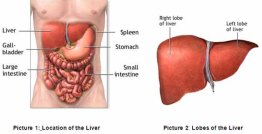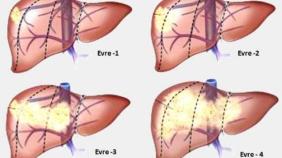Overview
Liver cancer is cancer that begins within the cells of your liver. Your liver may be a football-sized organ that sits within the upper right portion of your abdomen, beneath your diaphragm and on top of your stomach.

Several forms of cancer can type within the liver. the most common variety of liver cancer is hepatocellular carcinoma, that begins within the main variety of liver cell (hepatocyte). different forms of liver cancer, like intrahepatic cholangiocarcinoma and hepatoblastoma, area unit much less common.
Not all cancers that have an effect on the liver area unit thought of liver cancer. Cancer that begins in another space of the body — like the colon, lung or breast — and so spreads to the liver is termed metastatic cancer rather than liver disease. And this sort of cancer is named when the organ during which it began — like metastatic colon cancer to describe cancer that begins within the colon and spreads to the liver. Cancer that spreads to the liver is additional common than cancer that begins within the liver cells.
Symptoms and causes
Symptoms
Most people don’t have signs and symptoms in the early stages of primary liver cancer. When signs and symptoms do appear, they may include:
- Losing weight without trying
- Loss of appetite
- Upper abdominal pain
- Nausea and vomiting
- General weakness and fatigue
- Abdominal swelling
- Yellow discoloration of your skin and the whites of your eyes (jaundice)
- White, chalky stools
Causes
It’s not clear what causes most cases of liver cancer. But in some cases, the cause is known. For instance, chronic infection with certain hepatitis viruses can cause liver cancer.
Liver cancer occurs when liver cells develop changes (mutations) in their DNA — the material that provides instructions for every chemical process in your body. DNA mutations cause changes in these instructions. One result is that cells may begin to grow out of control and eventually form a tumor — a mass of cancerous cells.
Diagnosis
Diagnosing liver cancer
Tests and procedures used to diagnose liver cancer include:
- Blood tests. Blood tests may reveal liver function abnormalities.
- Imaging tests. Your doctor may recommend imaging tests, such as an ultrasound, computerized tomography (CT) scan and magnetic resonance imaging (MRI).
- Removing a sample of liver tissue for testing. Your doctor may recommend removing a piece of liver tissue for laboratory testing in order to make a definitive diagnosis of liver cancer.

During a liver biopsy, your doctor inserts a thin needle through your skin and into your liver to obtain a tissue sample. In the lab, doctors examine the tissue under a microscope to look for cancer cells. Liver biopsy carries a risk of bleeding, bruising and infection.
Determining the extent of the liver cancer
Once liver cancer is diagnosed, your doctor will work to determine the extent (stage) of the cancer. Staging tests help determine the size and location of cancer and whether it has spread. Imaging tests used to stage liver cancer include CTs, MRIs and bone scans.
There are different methods of staging liver cancer. One method uses Roman numerals I through IV, and another uses letters A through D. Your doctor uses your cancer’s stage to determine your treatment options and your prognosis. Stage IV and stage D indicate the most advanced liver cancer with the worst prognosis.
Treatment
Treatments for primary liver cancer depend on the extent (stage) of the disease as well as your age, overall health and personal preferences.
Surgery
Operations used to treat liver cancer include:
- Surgery to remove the tumor. In certain situations, your doctor may recommend an operation to remove the liver cancer and a small portion of healthy liver tissue that surrounds it if your tumor is small and your liver function is good.
Whether this is an option for you also depends on the location of your cancer within the liver, how well your liver functions and your overall health.
- Liver transplant surgery. During liver transplant surgery, your diseased liver is removed and replaced with a healthy liver from a donor. Liver transplant surgery is only an option for a small percentage of people with early-stage liver cancer.
Localized treatments
Localized treatments for liver cancer are those that are administered directly to the cancer cells or the area surrounding the cancer cells. Localized treatment options for liver cancer include:
- Heating cancer cells. In a procedure called radiofrequency ablation, electric current is used to heat and destroy cancer cells. Using an ultrasound or CT scan as a guide, your surgeon inserts one or more thin needles into small incisions in your abdomen. When the needles reach the tumor, they’re heated with an electric current, destroying the cancer cells.
- Freezing cancer cells. Cryoablation uses extreme cold to destroy cancer cells. During the procedure, your doctor places an instrument (cryoprobe) containing liquid nitrogen directly onto liver tumors. Ultrasound images are used to guide the cryoprobe and monitor the freezing of the cells.
- Injecting alcohol into the tumor. During alcohol injection, pure alcohol is injected directly into tumors, either through the skin or during an operation. Alcohol causes the tumor cells to die.
- Injecting chemotherapy drugs into the liver. Chemoembolization is a type of chemotherapy treatment that supplies strong anti-cancer drugs directly to the liver.
- Placing beads filled with radiation in the liver. Tiny spheres that contain radiation may be placed directly in the liver where they can deliver radiation directly to the tumor.
Radiation therapy
This treatment uses high-powered energy from sources such as X-rays and protons to destroy cancer cells and shrink tumors. Doctors carefully direct the energy to the liver, while sparing the surrounding healthy tissue.
During external beam radiation therapy treatment, you lie on a table and a machine directs the energy beams at a precise point on your body.
A specialized type of radiation therapy, called stereotactic radiosurgery, involves focusing many beams of radiation simultaneously at one point in your body.
Alternative medicine
Alternative treatments may help control pain in people with advanced liver cancer. Your doctor will work to control pain with treatments and medications. But sometimes your pain may persist or you may want to avoid the side effects of pain medications.
Ask your doctor about alternative treatments that may help you cope with pain, such as:
- Acupressure
- Acupuncture
- Deep breathing
- Listening to music (music therapy)
- Massage
MyMedOpinion.com gets you Medical Opinion from India’s top Specialists and Best Treatment Cost from World Class hospitals in India- in just 24-48 hours
MyMedOpinion.com affiliated Best hospitals in India provide an medical opinion from experienced surgeons and the treatment cost includes companion stay , surgeon fee, medicines and consumables, nursing care, patient’s food and airport pick up & drop etc. etc. We offer free, no obligation assistance to international patients to find world class medical treatment in India. We offer support and services to facilitate the care you require. We can help you find the best hospital in India
Send us a Medical Report to Get FREE Medical Opinion from India’s Top Doctors
MyMedOpinion.com is the hub of Surgeons and specialists for major diseases. We give you a chance to speak to our doctors and discuss your health issues directly.
Email Us: info@mymedopinion.com Call Us: +91-9654683991
Leave a comment